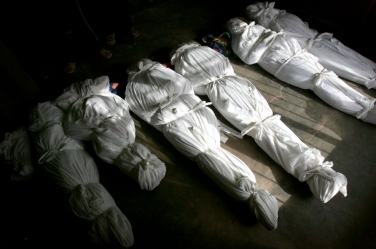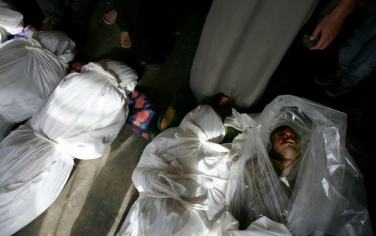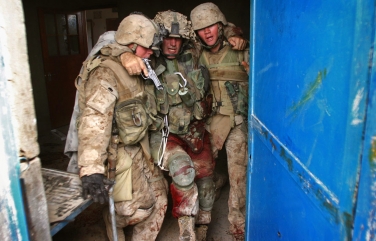 |
In Haditha
July 2006 |
 |
||||||||||||
|
In May of 2004 I was cleared for an embed with the 11th Marine Expeditionary Unit (11th MEU) and First Battalion Fourth Marines (1/4). I accompanied the Marines to Najaf, Iraq, by way of Hawaii, a six-week Pacific crossing, and Kuwait. Once there I was cleared to remain with the MEU and battalion for the duration of their deployment to photograph what I hoped would be a book covering their nine months away from home.
This is where my story and their story became our story.
Since the beginning of the summer, Third Battalion First Marines (3/1) had been manning the Fallujah perimeter, sucking up IEDs and mortars and waiting. When I headed north from Najaf the guys from 1/4 sent me to 3/1. From there, I'm passed off to Company K – Kilo Company. The first time I see any of them, a dozen Marines lay wounded and dying under a full moon after a rocket slammed into a football game. Olivera didn't make it. It was mortar time. A pointless death. Someone should have known better.
Kilo's Third Platoon was hit hardest in the city--the fight through the Jolan District and down Route Henry, then in the "Hell House"--Segura was killed and then Heflin. Nicoll left his leg there. Tran, Barroso, Kaufmann, Severtsgaard, Mitchell, Pruitt, Carlisle, Wright, Eldridge, Chandler wounded.
The battalion and company limped out of Fallujah heroes--a fistful of Bronze Stars, a Navy Cross. That Navy Cross was one of only eight since the war began. If the First Sergeant who earned it had died they probably would have given him The Medal. I took the photo that helped to bring him the recognition. In the image, two young Marines carry a grim older Marine from a house, his arms around their shoulders, lap and legs covered in blood, pistol still at the ready as he nearly bleeds to death. He saved Nicoll's life when he took the blast from the grenade. Then he gave up his tourniquet as he bled from 50 places. Books have been, are being written about it. The picture is now on posters wherever two or three Marines gather together, an example for generations of Marines to come.
To the Marines, I am that guy who took that picture. A year and a half later, my pictures of these same Marines run under the words "shame, massacre, bloodbath."
By October, we were lined up out in the desert outside Haditha behind the tanks and the tracks waiting to assault another city from the desert before dawn. Kilo Company was in the lead – the tip of the spear. They expected a fight. The reservists had been chewed up there. We'd all heard about it--the fight at the hospital where the insurgents used the patients as shields, one of the battalion's sniper teams rolled up, that track, 26 tons of steel and aluminum, ripped in half by three anti-tank mines and lifted into the air like a scrap of paper. Funerals all over Ohio.
A fight wasn't to be this time. With Kilo in front, 3/1 walked into Haditha like it was a thousand-man patrol.
Where did the insurgents go? Nowhere probably, just slipped back behind the counter at the butcher shop and the bakery, back into the classroom, back into the palm groves, back into the mosque. The next weeks and months I was there, Kilo never found any of them – at least not one with a rifle in his hands. Found lots of guys whose names showed up on lists: "suspected associate of…," "possible financier for…," "former regime this or that…." They just cuffed 'em and blindfolded 'em, filled out the statement, sent them up to regiment and hoped it did some kind of good. Mostly though they found scores of IEDs. IEDs out in the desert. IEDs under a beautiful new coat of asphalt. IEDs in the holes made by old IEDs. IEDs in the walls of buildings. IEDs in that garbage can that was empty when we passed by an hour ago.
The Marines grind themselves down running five, six patrols a day and the insurgents still manage to plant them. Some 14-year-old kid tries to plant one and rides out to the edge of town on his motorcycle. He should have connected the blue wire first. Now there's nothing left but engine parts, blood and an ID card. Mother says they haven't seen him for a couple of days, that he's been hanging out with his new friends but he's a good student, would never get mixed up in something like that. "Sorry, ma'am, we can show you where we found him." How many patrols a day to stop that?
After the referendum, I headed out West to the Syrian border and Al-Qa'im. It was the last place I hadn't been; just wanted to take a look around and stumbled into the biggest operation in a year, biggest on paper anyhow. To the grunts it ended up being what they call a "dump-ex" – an exercise in getting rid of all the extra ammunition they made you carry. Since the big battles of 2004 the insurgency had learned the important lesson that when the Marines line up in the desert you leave or go back to your day job. If you really want to kill yourself you might as well do it at the wheel of a car loaded down with explosives in the middle of a passing convoy or in front of a Shiite mosque. No sense being shot in the head while standing in the middle of the street fumbling with a RPG. The Marines ripped the place apart but mines and IEDs and a handful of guys too confused to know when to leave town left more Marines dead than it was probably worth. When it wrapped up after a couple of weeks it was time to go back to Haditha.
November 19, I was doing one last load of laundry, soaking up a little more contractor chow, and laying in my rack watching DVDs. It's hard to shake the feeling now, that if only I had gone back a day or two earlier I could have put myself between the Marines and the Iraqis and whatever did or didn't happen that day. Hard not to hear a voice saying, "If you hadn't wanted to sit on your ass another day or two maybe you wouldn't need to be writing this now."
All I knew when that patrol stepped off two days later was what I had been told--that an IED had killed my friend and then they had been fired on, that there had been fighting all over town that day, that a lot of insurgents and civilians had died in the fighting.
Of course, now I've gone over that day and those that followed in my mind a thousand times, been poked and prodded about it by writers and editors and men with badges, but no matter how many different ways I go at it, I can find nothing in my memory that should have raised an alarm. Everything I saw inside that house squared with everything I had been told. Afterwards, no one in the battalion tried to stop me from sending the images to the outside world though lots of the guys saw them. God knows what might have happened that day but I never saw anything to indicate a breakdown in discipline as extreme as the worst of the accusations. In the days that followed there were no whispers, no looks, no hints. In my months among them, though they were ferocious with their foe, they spoke of and lived in a culture of honor that had as an implicit law "no women, no children." If I hadn't believed that they were true to this law I never would have put my life in their hands, never would have risked my life so that we could remember theirs.
People die over there all the time, are dying right now. A room full, a house full, a street full of the dead is the numbing backdrop of everyday life in Iraq. In my mind, as I walked out of that house I only felt that I had made yet another mute, useless record of it. Only time will tell what happened there that day and whether I was right or wrong.
© Lucian Read
Dispatches are brought to you by Canon. Send Canon a message of thanks. |
|||||||||||||
Back to July 2006 Contents
|
|




